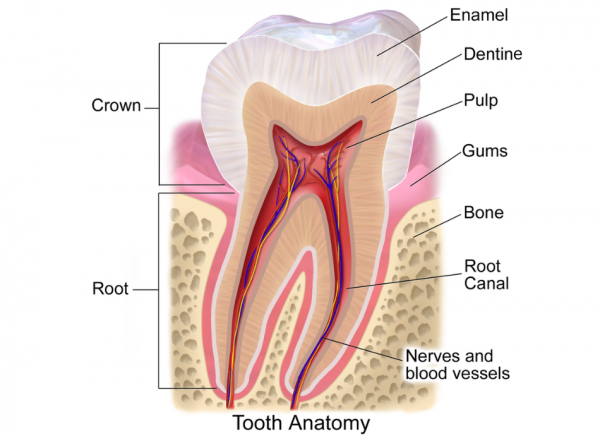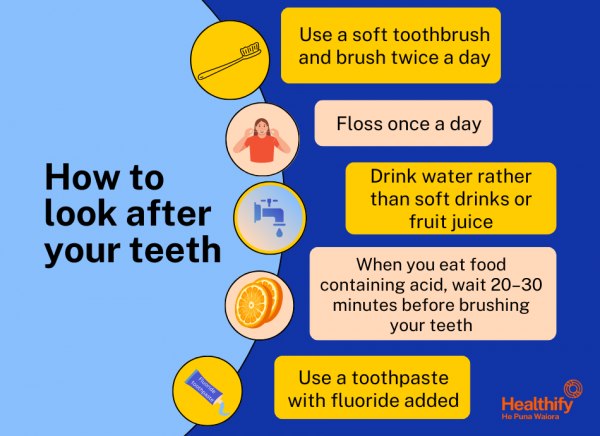Sensitive teeth
Key points about sensitive teeth
- A sensitive tooth is when you have a sharp, intense shooting pain that goes deep into the tooth.
- Sensitivity is commonly triggered by hot, cold, sweet or acidic food or drinks. Sometimes, simply breathing with your mouth open is enough to cause pain, especially if the air is cold.
- The pain usually passes very quickly, but sometimes it can last a few minutes or even hours.
- The longer the pain lasts the more likely it is that a serious problem exists, so any pain that lasts more than a few seconds should be checked by your dentist as soon as possible

Exposed dentine causes tooth sensitivity. At the centre of your tooth is the nerve or pulp. The next layer is called dentine, this has tiny tubes in it which carry the information about the food you are eating from your mouth to the nerve. The dentine is covered by hard protective enamel, this is the part of your tooth that you see. If the enamel is damaged, the tubules carry too much information to the nerve and your teeth feel sensitive.
The image below shows the different parts of a tooth.

Image credit: BruceBlausen Wikimedia Commons
Causes of dentine exposure
- Receding gums: The most common place for dentine to be exposed is where your tooth meets your gums. The enamel thins out and finishes near your gums. Normally your gums cover the dentine, but if they pull back over time the dentine is uncovered. This is usually because of brushing too hard (scrubbing your teeth) with a hard toothbrush.
- Gingivitis: Inflamed gums (gingivitis) caused by plaque on the surface of your teeth can produce sensitivity. This is due to the toxins and acids that are produced by the plaque bacteria entering the tubules in the exposed dentine and stimulating the nerves deep within the tooth.
- Tooth decay: Acid damages your tooth enamel causing a hole called a cavity. This allows food, drink and cold air to get into the sensitive layers of your tooth.
- Acidic food, drink or mouthwash: Acids in some mouthwashes, in foods such as oranges and tomatoes, and in drinks like fruit juices, soft drinks and sports drinks, can gradually erode tooth enamel to expose the dentine.
- Cracks: Cracks in the enamel of your tooth allow food particles and liquids into the deeper layers of your teeth. These cracks can also fill with bacteria and cause inflammation.
- Wear and tear to the enamel: Over time, chewing, tooth-grinding (known as bruxism) and brushing too hard can all wear away enamel, exposing the dentine underneath. Some people grind their teeth in their sleep and may not know they do it. A sore, tight or aching jaw (or a complaining partner) might be a clue that grinding your teeth might be the cause of your sensitive teeth.
- Tooth-whitening products: Products that contain baking soda or peroxide to whiten teeth can cause microscopic damage to tooth enamel and cause tooth sensitivity.
- Gastro-oesophageal reflux: Acid coming up form your stomach at night. Read more about reflux.
- Bulimia nervosa: An eating disorder with vomiting. Read more about bulimia.
- Nerve damage: Damage to the nerve at the centre of your tooth, eg, from an accident or dental work, can cause sensitivity.
Good dental hygiene is the best place to start.
- Use a soft toothbrush as this will lower your chance of overbrushing which can wear away enamel and gum.
- Brush your teeth twice a day.
- Floss (or use an interdental brush) once a day. Harakeke (flax) fibres work well, are easy to find and break down in the environment.
- Use fluoridated toothpaste (toothpaste with fluoride added) as fluoride helps harden your tooth enamel and can improve sensitivity over time. You can buy stronger fluoridated toothpaste for sensitive teeth at supermarkets.
- Drink water – the acids in soft drinks, sports drinks, and in fruits and juices (eg, oranges and kiwifruit) all erode tooth enamel. Sipping fruit juice or soft drinks through the day is more damaging than drinking a glass in one go because it means your enamel is constantly being attacked by acid.
- Avoid brushing your teeth for 20–30 minutes after eating acidic foods and drinks. Waiting allows your saliva (spit) to get to work in restoring the correct pH balance in your mouth, and begin to repair the damage caused by acidic food and drink.

Image credit: Healthify He Puna Waiora
If you already have sensitive teeth, you can also:
- Use a toothpaste designed for sensitive teeth. These contain ingredients that block the tubules in dentine (an example is calcium sodium phosphosilicate). However, it only works as long as you keep using it. As well as using a sensitive tooth toothpaste on your toothbrush, you can put a small amount directly on the sensitive areas before you go to bed. You can buy them from supermarkets or pharmacies.
When should I get help?
Make an appointment to see your dentist:
- If you have tried these things and still have sensitive teeth.
- If you suddenly get a sensitive tooth or teeth.
- If you think you might be grinding your teeth at night.
If tooth sensitivity is troubling you, or it doesn't improve, see your dentist, who may be able to offer other treatments.
- A fluoride gel or desensitising agent may be applied to the sensitive areas of the tooth.
- Your dentist may identify flaws or cavities that can be fixed with a filling, bonding, crown or inlay.
- If you've lost a lot of gum tissue, your dentist may recommend a gum-graft to cover the root of the tooth.
- As a last resort, if nothing else has worked, endodontic (root canal) treatment may be recommended. The nerve(s) of the tooth are removed, the centre is filled and a crown placed over the tooth.
Apps reviewed by Healthify
You may find it useful to look at some Nutrition, exercise and weight management apps.
Apps
Nutrition, exercise and weight management apps
References
- Sensitive teeth(external link) Auckland Dental Association, NZ
- How to cope with sensitive teeth(external link) NHS, UK
Credits: Healthify editorial team. Healthify is brought to you by Health Navigator Charitable Trust.
Reviewed by: Dr Emma Dunning, Clinical Editor and Adviser
Last reviewed:





